Adjutant General of Texas
The Adjutant General (TAG) of Texas is the commander and chief executive officer of the Texas Military Department, the executive department of the Texas Military Forces. The adjutant general's position of authority over Texas Military Forces is second only to the commander-in-chief, the Governor of Texas. This position is analogous to the United States Secretary of Defense. The Adjutant General of Texas is appointed by the Governor of Texas with the advice and consent of the Texas Senate from Texas Government Code Title 4, Subtitle C, Chapter 437.003.[1]
| Adjutant General of Texas | |
|---|---|
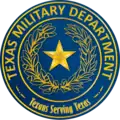 Seal of the Department | |
| Texas Military Department Office of the Adjutant General | |
| Status | Commander and CEO |
| Abbreviation | TAG |
| Reports to | Governor of Texas |
| Seat | Building Eight Camp Mabry, Austin, Texas 30°18′42.173″N 97°45′38.338″W |
| Appointer | Governor of Texas with Texas Senate advice and consent |
| Term length | Two years |
| Constituting instrument | 4 T.G.C., Sub. C., Sec. 437.003 |
| Formation | 5 August 1836 |
| First holder | Albert Sidney Johnston |
| Deputy | Brigadier General Greg Chaney and Major General Dawn Ferrell |
| Website | https://tmd.texas.gov/office-of-the-adjutant-general |
The Constitution of Texas vests all military authority in the commander-in-chief, an elected position, to maintain civilian control of the military. It is impractical for the Governor of Texas to operate the military themselves, so their command authority is delegated via commission to the adjutant general. The adjutant general, secretary of state, attorney general, and comptroller are generally regarded as the most important executive positions in the Government of Texas.
History
Texas Military Forces were established in 1835 in concurrence with the Texas Revolution. The War Department, headed by the Secretary of War, was established by the 1st Congress of the Republic of Texas on August 5, 1836, which included the Texas militia, Texas Army, Texas Navy, Texas Rangers, and Office of the Adjutant General first held by Colonel Albert Sidney Johnston from August 5, 1836 to November 16, 1836.
When Texas joined the United States, the Texas Army and Texas Navy were integrated into the United States Armed Forces. The War Department was re-designated the Department of Texas and the Secretary of War position was abolished. The Adjutant General position was elevated to run the department, which now Office of the Adjutant General, Texas militia, and Texas Rangers. The department was abolished from February 4, 1856 - April 6, 1860 due a fire on October 10, 1855 that destroyed nearly all records.
The department was again abolished from January 1, 1867 - June 24, 1870 during the military occupation and reconstruction of Texas. After Texas was readmitted to the United States on March 30, 1870, the department was reestablished. It comprised the Office of the Adjutant General, Texas militia and Texas State Police (Texas Rangers). Following the Militia Act of 1903, the Texas militia became the Texas National Guard. During World War I, the Department of Texas was re-designated the Adjutant General Department and again maintained provincial "Home Guard" forces for defense of the state while the Texas National Guard was under federal command. By 1935, the Texas Rangers had evolved from a paramilitary force to a police force and were reorganized under the Texas Department of Public Safety. During World War II, the United States Congress amended the National Defense Act of 1916 permanently authorizing the "Home Guard" defense forces as the Texas State Guard. The Adjutant General Department was colloquially referred to as the "Texas Military" from 2006-2015. On October 28, 2015 the Adjutant General Department was officially rebranded as the Texas Military Department.[2]
Powers and functions
Office of the Adjutant General
The Office of the Adjutant General (OAG) is the general and their deputy's (mainly) civilian staff.
OAG is the principal staff element of the Adjutant General in the exercise of policy development, planning, resource management, fiscal and program evaluation and oversight, and interface and exchange with other Texas Government departments and agencies, foreign governments, and international organizations, through formal and informal processes. OAG also performs oversight and management of Texas Military Forces.
Awards and decorations
- The Texas Adjutant General's Individual Award, is the eighth highest military decoration that may be awarded to a service member of the Texas Military Forces.
- The Texas Adjutant General’s Certificate of Commendation
- The Texas Adjutant General’s Certificate of Appreciation
Former Adjutants General
*Military ranks at time of office:
| Number | Portrait | Adjutant General | Took office | Left office | Time in office | Commander-in-Chief
serving under |
Ref |
|---|---|---|---|---|---|---|---|
| - | Colonel John Austin Wharton | December 9, 1835 | July 5, 1836 | 5 months | Major General Sam Houston | [3] | |
| 1 |  |
Colonel Albert Sidney Johnston | August 5, 1836 | November 16, 1836 | 3 months | Governor James Robinson, | [4] |
| 2 | Colonel Edwin Morehouse | December 22, 1836 | President Sam Houston | [4] | |||
| 3 | Colonel Hugh McLeod | October 24, 1837 | January 18, 1841 | 3 years,
2 months |
President Sam Houston, | [4] | |
| (Acting) Colonel James Davis | May 3, 1842 | July 31, 1842 | 2 months | President Sam Houston | [4] | ||
| 4 |  |
Colonel William Gordon Cooke | January 16, 1843 | April 27, 1846 | 3 years,
3 months |
President Sam Houston, | [4] |
| (Acting) Colonel Duncan Campbell Ogden | 1846 | Governor James P. Henderson | [5][6] | ||||
| 5 | Colonel Charles L. Mann | December 24, 1847 | March 4, 1848 | 2 months | Governor James P. Henderson | [4] | |
| 6 | Colonel John Drayton Pitts | March 4, 1848 | Governor George Wood, | [4] | |||
| 7 | Major James Shackleford Gillett | November 24, 1851 | February 4, 1856 | 4 years,
2 months |
Governor Peter Bell, | [4] | |
| Office abolished due to October 10, 1855 fire | February 4, 1856 | April 6, 1860 | 4 years,
2 months |
[4] | |||
| 8 | .jpg.webp) |
Civilian Anthony Banning Norton | April 6, 1860 | Governor Sam Houston | [4] | ||
| 9 | Lieutenant Colonel William Byrd | March 25, 1861 | Governor Edward Clark | [4] | |||
| 10 | Colonel Jeremiah Yellot Dashiell | November 11, 1861 | Governor Francis Lubbock | [4] | |||
| 11 |  |
Lieutenant Colonel David Browning Culberson | November 17, 1863 | November 1864 | 1 year | Governor Francis Lubbock | [4] |
| 12 | Colonel John Burke | November 1, 1864 | May 13, 1865 | 6 months | Governor Pendleton Murrah | [4] | |
| 13 | Major Davis R. Gurley | May 13, 1865 | January 1, 1867 | 1 year,
7 months |
Governor James Throckmorton, | [4] | |
| Office abolished due to Reconstruction | January 1, 1867 | June 24, 1870 | Military Governor Andrew Hamilton | [4] | |||
| 14 | .jpg.webp) |
Colonel James Davidson | June 24, 1870 | November 15, 1872 | Governor Edmund Davis | [4] | |
| 15 | Civilian Frank L. Britton | November 14, 1872 | January 20, 1874 | Governor Edmund Davis, | [4] | ||
| 16 |  |
Brigadier General William S. Steele | January 20, 1874 | January 25, 1879 | Governor Richard Coke, | [4] | |
| 17 | .jpg.webp) |
Major John B. Jones | January 25, 1879 | July 19, 1881 | Governor Oran Roberts | [4] | |
| 18 | 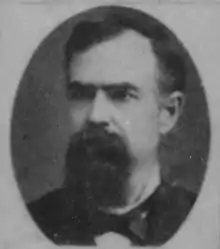 |
Colonel Wilburn Hill King | July 25, 1881 | January 23, 1891 | Governor Oran Roberts, | [4] | |
| 19 |  |
Brigadier General Woodford Haywood Mabry | January 23, 1891 | May 5, 1898 | Governor Jim Hogg, | [4] | |
| 20 | 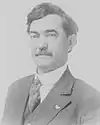 |
Brigadier General Alfred Prior Wozencraft | May 5, 1898 | January 17, 1899 | Governor Charles Culberson | [4] | |
| 21 | Major Thomas Scurry | January 17, 1899 | June 1, 1903 | Governor Joseph Sayers | [4] | ||
| 22 | Brigadier General John Augustus Hulen | June 1, 1903 | January 23, 1907 | Governor Samuel Lanham | [4] | ||
| 23 | Brigadier General James Oscar Newton | January 23, 1907 | December 15, 1910 | Governor Thomas Campbell | [4] | ||
| 24 | Brigadier General Robert H. Beckham | December 15, 1910 | January 23, 1911 | Governor Oscar Colquitt | [4] | ||
| 25 | .jpg.webp) |
Brigadier General Henry Hutchings | January 23, 1911 | September 29, 1917 | Governor Oscar Colquitt, | [4] | |
| 26 |  |
Major James A. Harley | September 29, 1917 | September 30, 1919 | Governor William Hobby | [4] | |
| 27 | Wesley D. Cope | October 1, 1919 | January 20, 1921 | Governor William Hobby | [4] | ||
| 28 | Major General Thomas Dickson Barton | January 20, 1921 | January 23, 1925 | Governor Pat Neff | [4] | ||
| 29 | First Lieutenant William Mark McGee | January 24, 1925 | December 5, 1925 | Governor Miriam Ferguson | [4] | ||
| 30 | Colonel Dallas J. Matthews | December 5, 1925 | January 20, 1927 | Governor Miriam Ferguson | [4] | ||
| 31 | Brigadier General Robert L. Robertson | January 20, 1927 | January 22, 1931 | Governor Dan Moody | [4] | ||
| 32 | Captain William Warren Sterling | January 22, 1931 | January 15, 1933 | Governor Ross Sterling | [4] | ||
| 33 | .jpg.webp) |
Major General Henry Hutchings | January 18, 1933 | January 15, 1935 | Governor Miriam Ferguson | [4] | |
| 34 | Colonel Carl Eugene Nesbitt | January 15, 1935 | January 25, 1939 | Governor James Allred | [4] | ||
| 35 | Brigadier General Harry Knox Jr | January 26, 1939 | December 31, 1939 | Governor Wilbert O'Daniel | [4] | ||
| 36 | Brigadier General John Watt Page Sr | January 1, 1940 | March 4, 1943 | Governor Wilbert O'Daniel, | [4] | ||
| 37 | Major General Arthur Balfour Knickerbocker | March 4, 1943 | May 7, 1947 | Governor Coke Stevenson | [4] | ||
| 38 | Major General Kearie Lee Berry | May 7, 1947 | July 1, 1961 | Governor Beauford Jester, | [4] | ||
| 39 | Major General James Edward Taylor | July 1, 1961 | January 1, 1962 | Governor Price Daniel | [4] | ||
| 40 | Major General Thomas Sams Bishop | January 1, 1962 | March 13, 1969 | Governor John Connally | [4] | ||
| 41 | Lieutenant General Ross Ayers | March 13, 1969 | March 1, 1973 | Governor Preston Smith | [4] | ||
| 42 | Major General Thomas Sams Bishop | March 1, 1973 | January 17, 1979 | Governor Dolph Briscoe | [4] | ||
| 43 | Major General Willie Lee Scott | January 17, 1979 | February 21, 1985 | Governor Bill Clements, | [4] | ||
| 44 | Major General James Thomas Dennis | February 21, 1985 | April 24, 1989 | Governor Mark White, | [4] | ||
| 45 | Major General William C. Wilson | April 24, 1989 | January 7, 1993 | Governor Bill Clements, | [4] | ||
| 46 | Major General Sam C. Turk | January 7, 1993 | November 16, 1995 | Governor Ann Richards, | [4] | ||
| 47 | 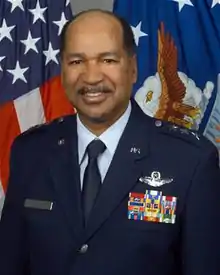 |
Lieutenant General Daniel James III | November 16, 1995 | August 9, 2002 | Governor George W. Bush, | [4] | |
| 48 |  |
Major General Wayne D. Marty | August 9, 2002 | June 12, 2005 | Governor Rick Perry | [4] | |
| 49 | 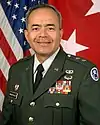 |
Major General Charles G. Rodriguez | June 12, 2005 | March 2, 2009 | Governor Rick Perry | [4] | |
| 50 |  |
Major General Jose S. Mayorga Jr. | March 2, 2009 | February 16, 2011 | Governor Rick Perry | [4] | |
| 51 | 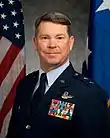 |
Major General John Frederick Nichols | February 16, 2011 | December 31, 2018 | Governor Rick Perry, | [4] | |
| 52 | .jpg.webp) |
Major General Tracy R. Norris | January 1, 2019 | Present | Governor Greg Abbott | [4] |
See also
- Texas Military Forces
- Texas Military Department
- List of conflicts involving the Texas Military
- Awards and decorations of the Texas Military
- United States Secretary of Defense
| Wikimedia Commons has media related to State adjutants general of Texas. |
References
- "TEXAS GOVERNMENT CODE TITLE 4. EXECUTIVE BRANCH SUBTITLE C. STATE MILITARY FORCES AND VETERANS CHAPTER 437. TEXAS MILITARY". Texas Constitution and Statutes.
- Chaney, Colonel Gregory P. (October 28, 2015). "JFTX I15-23. Texas Military Department (TMD) Rebranding Implementation" (PDF). Texas Military Department. Retrieved August 31, 2019.
- Kemp, Louis W. "WHARTON, JOHN A." San Jacinto Museum of History.
- "ADJUTANT GENERALS OF TEXAS". Texas Military Forces Museum. Retrieved August 31, 2019.
- Cutrer, Thomas W. "Ogden, Duncan Campbell". Texas State Historical Association. Retrieved May 12, 2020.
- Barnes, Charles Merritt (1910). Combats and Conquests of Immortal Heroes: Sung in Song and Told in Story. San Antonio, Texas: Brookaven Press. p. 253. ISBN 9781403500991. Retrieved May 12, 2020.